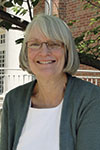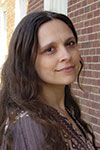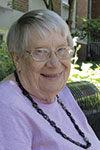Kelso Museum Curators Honored with Anderson Award
At its 229th commencement, Pittsburgh Seminary presented the John Anderson Award of Merit to Dr. Karen Bowden Cooper ’98, Jennifer M. Christmas ’11, and Nancy L. Lapp (1930-2025)—three curators emeritae of the Seminary’s Kelso Museum of Near Eastern Archaeology. Named for Pastor John Anderson, founding president of the Seminary in 1794, this award is bestowed by the Seminary’s Board of Directors upon those individuals who have contributed distinctive service to the Seminary and community at large.
 Dr. Karen Bowden Cooper ’98 served as curator of the Kelso Museum and lecturer in Hebrew at Pittsburgh Theological Seminary from 2000 to 2016. She oversaw the conservation, interpretation, and exhibition of artifacts from key archaeological sites such as Bab edh Dhra, Beitin/Bethel, and Herodian Jericho, welcoming more than 3,000 visitors to the Museum annually. She secured new acquisitions and long-term loans for the Museum, deepening its offerings to students, scholars, and the public. Since her retirement, Dr. Bowden Cooper has continued to volunteer extensively with the Museum, hosting open houses, receiving visiting scholars, managing communications with external partners, delivering educational presentations, and caring for the artifact collection. She holds a bachelor’s degree from Connecticut College, a master’s degree from PTS, and a doctorate from UC Berkeley.
Dr. Karen Bowden Cooper ’98 served as curator of the Kelso Museum and lecturer in Hebrew at Pittsburgh Theological Seminary from 2000 to 2016. She oversaw the conservation, interpretation, and exhibition of artifacts from key archaeological sites such as Bab edh Dhra, Beitin/Bethel, and Herodian Jericho, welcoming more than 3,000 visitors to the Museum annually. She secured new acquisitions and long-term loans for the Museum, deepening its offerings to students, scholars, and the public. Since her retirement, Dr. Bowden Cooper has continued to volunteer extensively with the Museum, hosting open houses, receiving visiting scholars, managing communications with external partners, delivering educational presentations, and caring for the artifact collection. She holds a bachelor’s degree from Connecticut College, a master’s degree from PTS, and a doctorate from UC Berkeley.
 Jennifer Christmas ’11 served as assistant (2016) then associate (2016-2023) curator of the Kelso Museum. Jen worked to expand the Museum’s public outreach, making knowledge of daily life in ancient contexts accessible to both local and international communities through the Museum’s artifact collection and interactive educational programming. She brought selections of the Museum’s resources to off-campus venues, such as local churches, offering opportunities to interact with hands-on artifacts, view 1930s film footage of everyday life and of excavation work at Tel Beit Mirsim (Israel), and hear a presentation explaining key geographical features of biblical lands. She also worked to give the Museum presence at public events such as International Archaeology Day at the University of Pittsburgh and the annual Highland Park Pottery Tour. She holds a bachelor’s degree from the University of Pittsburgh and a master’s degree from Pittsburgh Theological Seminary.
Jennifer Christmas ’11 served as assistant (2016) then associate (2016-2023) curator of the Kelso Museum. Jen worked to expand the Museum’s public outreach, making knowledge of daily life in ancient contexts accessible to both local and international communities through the Museum’s artifact collection and interactive educational programming. She brought selections of the Museum’s resources to off-campus venues, such as local churches, offering opportunities to interact with hands-on artifacts, view 1930s film footage of everyday life and of excavation work at Tel Beit Mirsim (Israel), and hear a presentation explaining key geographical features of biblical lands. She also worked to give the Museum presence at public events such as International Archaeology Day at the University of Pittsburgh and the annual Highland Park Pottery Tour. She holds a bachelor’s degree from the University of Pittsburgh and a master’s degree from Pittsburgh Theological Seminary.
 Nancy Lapp (1930-2025) served as curator of the Kelso Museum from 1970 to 2000 and was named curator emerita upon her retirement. She held a bachelor’s degree from the University of Cincinnati and a master’s degree from McCormick Theological Seminary. Internationally respected for her expertise and publications, she was the first female research assistant to the renowned Dr. William F. Albright and played a vital role in major archaeological expeditions across the Eastern Mediterranean. Following the death of her husband and excavation partner, Dr. Paul Lapp (who taught at the Seminary), Nancy continued their work, meticulously analyzing and publishing findings from sites such as Shechem, Wadi ad-Daliyah, and Tell er-Rumeith. In retirement, she remained active at the Seminary, receiving international teams of scholars and continuing to publish findings from her and her husband’s excavations. A longtime friend and contributor to the American Society of Overseas Research, Nancy was honored by the organization with the creation of the Nancy Lapp Popular Book Award in 2015.
Nancy Lapp (1930-2025) served as curator of the Kelso Museum from 1970 to 2000 and was named curator emerita upon her retirement. She held a bachelor’s degree from the University of Cincinnati and a master’s degree from McCormick Theological Seminary. Internationally respected for her expertise and publications, she was the first female research assistant to the renowned Dr. William F. Albright and played a vital role in major archaeological expeditions across the Eastern Mediterranean. Following the death of her husband and excavation partner, Dr. Paul Lapp (who taught at the Seminary), Nancy continued their work, meticulously analyzing and publishing findings from sites such as Shechem, Wadi ad-Daliyah, and Tell er-Rumeith. In retirement, she remained active at the Seminary, receiving international teams of scholars and continuing to publish findings from her and her husband’s excavations. A longtime friend and contributor to the American Society of Overseas Research, Nancy was honored by the organization with the creation of the Nancy Lapp Popular Book Award in 2015.
The Kelso Museum of Near Eastern Archaeology at Pittsburgh Theological Seminary houses a significant collection of artifacts from four sites in the Eastern Mediterranean region dating from several periods as far back as the Early Bronze Age (3300-2100 BCE) as well as diaries, correspondences, drawings, photographs, video footage, and other one-of-a-kind, primary records documenting the excavation of these sites. The Museum regularly receives teams of scholars from around the world who advance their research through firsthand study of unique records and artifacts housed in the Kelso Museum.
The Seminary expresses its gratitude to these talented individuals for their remarkable work to curate the Museum’s treasury of knowledge for the enrichment of the wider community.
